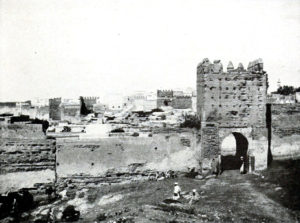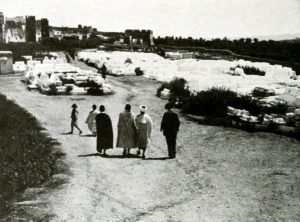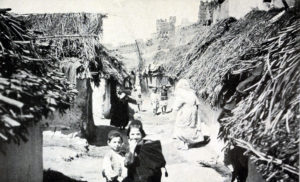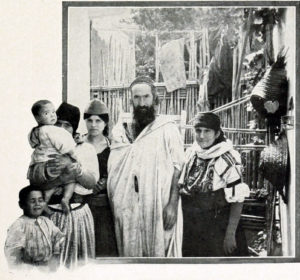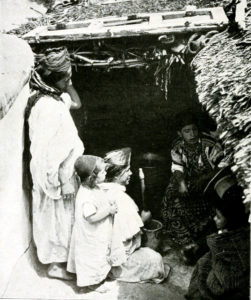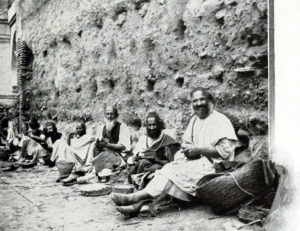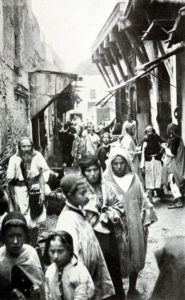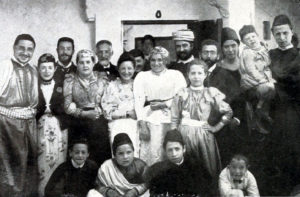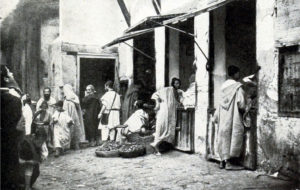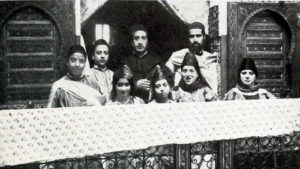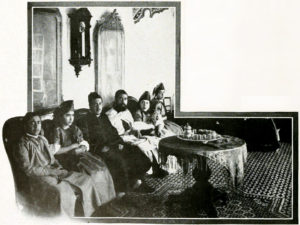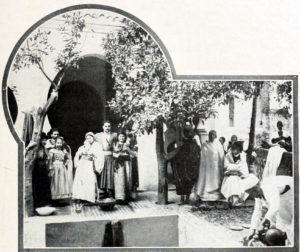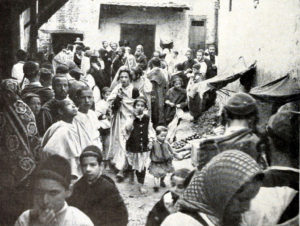
In 1890s Morocco, Jews in Fez were concentrated in the city’s crowded walled ghetto, the Mellah. (Click photos to enlarge.)
Today’s “guest blogger” from the past is Burton Holmes (1870–1958), the noted American traveler, lecturer and photographer who coined the term “travelogue.”
His first published travelogue includes about 20 photos of the Jewish ghetto in Fez from his 1894 trip to Morocco. By modern standards, his narration often lacks cultural sensitivity, and I do wish he had chosen a broader range of subjects. Even so, the pictures are worth a look. Here are some of them, along with bits of his narrative.
From the book Burton Holmes Travelogues
with Illustrations from Photographs by the Author, vol. 1
(1919 edition)
The next day we devote to the Jewish quarter, a distinct and separate city, called the “Mellah.”
We approach it through the Hebrews’ burial ground, a place of whited sepulchers, dwellings for the dead, and dingy huts, temporary abodes for living men and women; for there are two populations in the Jewish cemetery, a fixed population of the wealthy dead, a passing population of the living poor. You must remember that in these Moorish cities the Jews are still compelled to dwell apart [from Muslims]… Their houses are confined in the restricted Mellah, where no provision was originally made for an increase of population. Therefore the poorer and the weaker Jews have been squeezed out of its gates and have found refuge here in the city of the dead, where they have built crude huts and begin life anew…
The right to build these shelters in the cemetery was granted by the Sultan to the poor, when the overcrowding of the Mellah proper became a menace to public health…
[Holmes says that Jews in cities everywhere in the world have local charities to look after poor Jews, except in Fez. He adds that overcrowding and unsanitary conditions are the rule, and that most educational and relief efforts there are the work of the Paris-based Alliance Israélite Universelle.]
We can assure all those who have given pecuniary support to the Alliance that the money is here spent conscientiously, and that the work now doing among the Moorish Jews is nobly done and worthy the sympathy and encouragement of every lover of humanity. But… many reforms in customs remain to be effected, and it is to be hoped that in the future, a daughter of the Mellah will not be given in marriage at the age of ten and, like one girl we saw, be a mother of a family at fourteen years of age… Let us hope that in another generation girl-children who at fourteen are still unmarried will not be regarded, as they are to-day, in the light of hopeless spinsters…
In tiny shops, like niches bordering these streets, sit the gold- and silver-smiths, the lawyers, scribes, and money-changers; there are few idlers here… A few shops boast a supply of foreign merchandise. The merchants greet us with a polite “buenos dias,” and converse in fluent Spanish; for besides Hebrew and Arabic, these people speak the language of the land from which their fathers were cruelly cast out by Spanish kings…
…We made a formal call one Sabbath afternoon at the home of one of the richest Jews in Fez, old Mr. Bensimon. Magnificent, indeed, is the interior of the house, with its carved, painted doors, its stucco arabesques, immaculate tiled floors, and richly furnished rooms. The Bensimons are of the old conservatives. They speak no Spanish and have no knowledge of anything away from their immediate surroundings. The Mellah is their world; their house is one of [its] rare oases of elegance… Before departing we were asked to take tea with the family…

